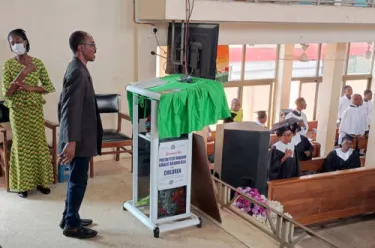Strengthening the Church
A Letter from Josh Heikkila, mission co-worker serving in West Africa
Subscribe to my co-worker letters
Dear friends,
At the end of June, I had the opportunity to take a quick trip to the United States, to attend the biannual Presbyterian General Assembly in Salt Lake City, Utah. What struck me most about my time at the assembly was the repeated discussion about the shrinking size of the Presbyterian Church in the United States, and how many of our Presbyterian congregations – in particular, the small ones among us – are without ordained pastoral leadership.
When hearing this lament voiced again and again, I couldn’t help but feel like this might be an area where the church in Ghana has something valuable to teach us in the U.S., in particular when it comes to congregational leadership.

Traditionally, the two Presbyterian partners in Ghana – the Presbyterian Church of Ghana and the Evangelical Presbyterian Church Ghana – didn’t have enough ordained clergy to oversee all their congregations. It was normal for a group of churches to be placed together in a district led by one pastor, perhaps like an old Methodist circuit. If a district had four congregations, the pastor would go to only one on a Sunday morning, and the other three would hold worship under the leadership of the church’s elders and catechist. Some districts could be as small as two congregations, and some in the rural north of Ghana could number more than twenty.
As the name implies, a catechist was someone who would cultivate people in Christian faith and teach them the catechism of the church, to prepare them to become fully confirmed members. Because Ghanaian Presbyterian congregations historically had schools attached to them, catechists frequently came from the ranks of schoolteachers who had been trained by the church, and they had a job in both the school and the church. Nowadays, catechists continue to function in this way, but the position has evolved to be more like a full-time congregational lay leader. Perhaps it’s similar to what we in the Presbyterian Church (U.S.A.) now call a Commissioned Ruling Elder.
In Ghana, the church has often seen this lack of ordained clergy to be one of its main weaknesses. The late Rev Seth Agidi, a former moderator of the Evangelical Presbyterian Church Ghana, said that pastors could easily become “ritual specialists,” going from congregation to congregation on Sunday, with only time for the Lord’s Supper and baptism. He believed the district model left pastors unable to provide strong enough care and leadership for congregations to thrive. This is a valid concern. I know one of these district pastors who oversees more than 20 small congregations, and much of what he does on Sundays, Wednesday, Fridays and Saturdays is pop in to provide communion and leave. The sacraments in themself have become a full-time job!
However, I think there is also a hidden strength to this model of ministry, as well. Most congregations in Ghana have a roster of preachers for the quarter, and the elders serving in leadership, together with leaders of the youth, young adults, men’s and women’s fellowships and choir groups are added to the roster. If you are a leader in the church, you are expected to step forward and preach from time to time, to lead the liturgy, and to read scripture in worship. This is in addition to any leadership you might provide for small group ministry. Sometimes even when a pastor is present in worship, elders will still preach and lead the congregation. In my experience, this type of ministry has been incredibly empowering for members of the church.
I think any pastor serving in the United States can tell you about times when there might be a visitor to the congregation, and a church member will come up to you and say, pastor, there’s a visitor, go say hello and welcome them. And you think to yourself, can’t you also show the visitor Christian hospitality? One time before I was ordained, there was a snowstorm which shut down the roads to the congregation I attended, and only those of us within walking distance were able to make it to church. The ten of us who showed up said a prayer, read scripture, sang a hymn, and then went home. Because the pastor wasn’t present, we felt like we really couldn’t hold worship. In Ghana, if a pastor didn’t show up at the last minute, I think the congregation would still be able to pull off a lively and spiritual three-hour service without them!
One of the older Books of Order of the Presbyterian Church USA says some great things about the office of elder. Part of the expectations for an elder are this:
It is the duty of elders, individually and jointly, to strengthen and nurture the faith and life of the congregation committed to their charge. Together with the pastor, they should encourage the people in the worship and service of God, equip and renew them for their tasks within the church and for their mission in the world, visit and comfort and care for the people, with special attention to the poor, the sick, the lonely, and those who are oppressed. (Book of Order, 2007-09, G-6.0304.)
I believe if we could find a way for everyone in the church to live up to this description of ministry, our congregations would be marked by a strong, vibrant, and relevant faith – whether they had an ordained pastor or not.
Someday, when the churches in Ghana hold training for new installed elders, I hope we can have some friends from PC(USA) in attendance. I’m certain that if we can learn more about how they practice this aspect of our Presbyterian Christian tradition, we in the United States will only be strengthened by it.
Blessings from Ghana,
Josh
